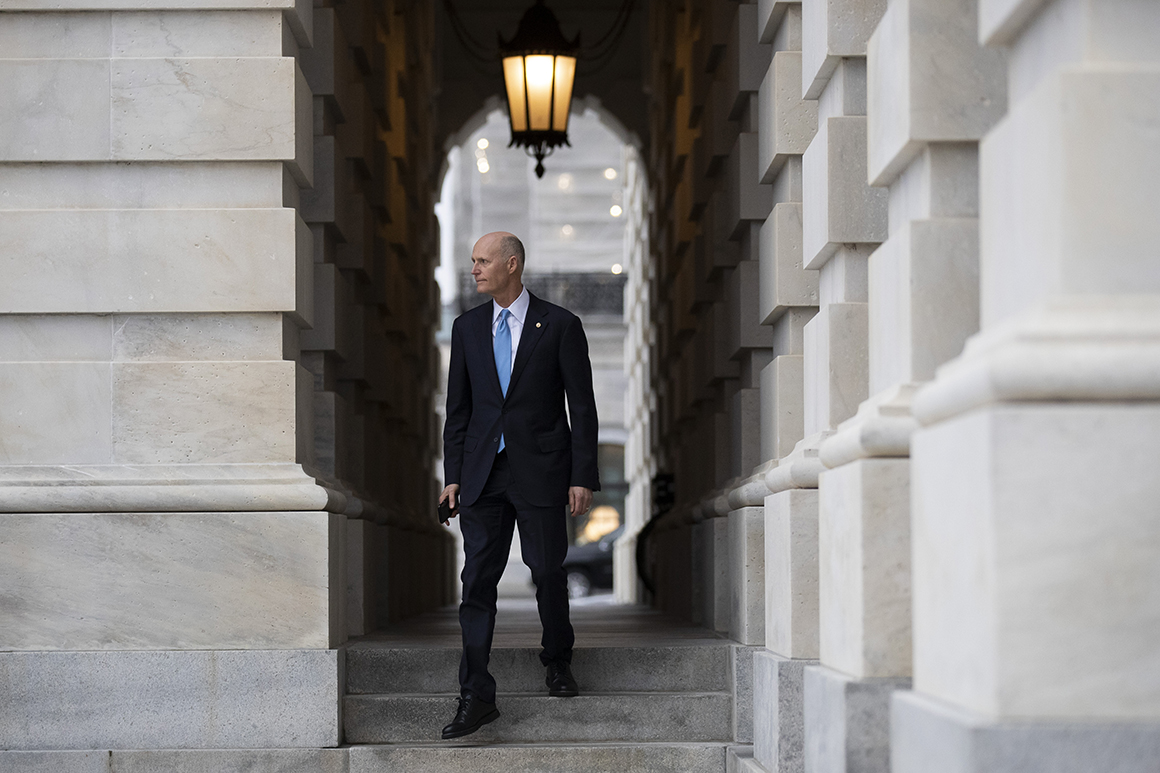
“It’s like a bad movie. It’s like the sinister person goes out and causes a problem and then only they can solve the problem — but it’s going to cost you money,” Sen. Rick Scott (R-Fla.), who has proposed aggressive measures to punish China, said in an interview. “That’s exactly what this is. They caused this problem.”
Scott has secured a commitment from Senate Homeland Security Committee Chairman Ron Johnson (R-Wis.) to investigate the World Health Organization’s handling of the pandemic. The WHO is under fire for allegedly not taking a harder stance against Beijing even as it downplayed the crisis; the U.N. body is also accused of poor judgment for publicizing a preliminary Chinese finding suggesting that Covid-19 could not be transmitted from human to human. Since that assessment, the virus has spread across the globe, killing tens of thousands of people and bringing many economies to a near halt.
The Florida Republican isn’t the only senator looking to whack Beijing. Senate Foreign Relations Committee Chairman Jim Risch (R-Idaho) joined calls for a WHO probe on Tuesday, including an examination of whether U.S. funding of the group should be revoked. Sen. Steve Daines (R-Mont.) recently called on the State Department to conduct its own investigation into China’s role, while Sen. Marsha Blackburn (R-Tenn.) wants Beijing to forgive U.S. debt and Sen. Tom Cotton (R-Ark.) is looking to sanction Chinese officials.
“The bottom line is the WHO’s actions and China’s actions killed a lot of people. We would have been way farther ahead if we believed in the first part of January there was local transmission,” Scott said. “And we would’ve gotten ahead on the testing, we would’ve gotten ahead on the protective gear, we would’ve gotten ahead on the ventilators. And so there are people who are dead now, and it’s all because China didn’t do the right thing and the WHO didn’t do the right thing.”
But President Donald Trump and Secretary of State Mike Pompeo seem to be biting their tongues when it comes to criticizing Beijing directly. Trump has recently talked up his close relationship with Chinese President Xi Jinping, especially after the two leaders spoke by phone late last month about the pandemic, though on Tuesday he told reporters he was considering cutting federal funding for the WHO over its coronavirus response and being “very China-centric.” The Trump administration, too, has faced criticism over its mixed messaging on the virus in the early stages of the outbreak.
Pompeo was asked Tuesday why he has stopped using the phrase “Wuhan virus,” a reference to the Chinese city where the disease is believed to have originated. He sidestepped the question, instead delivering a lengthy statement about the need for countries to be open and transparent about the virus’ effect on their populations. Notably, he did not use the word “China.”
“Every nation, be they a democracy or not, has to share this information in a transparent, open, efficient way,” he said during a news conference at the State Department. “There are still lots of things we don’t know. We can only know then when the dataset, the global dataset, is available to every party.”
A Trump administration official, granted anonymity to candidly assess the matter, said the White House’s hawkish position on China was still operative, but there remains a “question of emphasis” on those views as the world responds to the coronavirus pandemic.
“You’ll see other examples in the coming days where senior officials say contrary things,” the official predicted. “Different people are pursuing different objectives with short-term thinking because of the need to respond to a public health emergency.”
Pompeo also announced Tuesday that the U.S. is committing an additional $225 million to overseas aid for countries affected by the virus, but that the assistance would not include personal protective equipment (PPE) because the U.S. itself is short on such critical medical gear.
The new funds come on top of an earlier $274 million committed by the U.S. for overseas aid due to the virus. The announcement also comes as China has touted its own international giving in response to the pandemic, casting itself as a global savior. The Chinese government, for example, is helping to facilitate the transfer of 1,000 ventilators to New York, one of the hardest hit states.
Some analysts have lamented that dynamic as a “propaganda coup” for China in the face of criticism over its own internal handling of the virus. But with the U.S. in dire need of critical medical equipment from China, White House officials may feel limited in what they can say.
“This is a case where it’s important to call China out on behavior that endangers global public health, but it’s also important to bear in mind the urgent over the merely important,” said Stewart Patrick, an international relations expert with the Council on Foreign Relations. “We have a common enemy here.”
He added: “History is full of examples of adversaries making common cause against a more immediate threat. There will be time enough to pick up that competition later.”
Sen. Mike Braun (R-Ind.) said punitive measures in a time of crisis could backfire on the U.S. and other countries looking to bounce back as quickly as possible.
“I’m not so interested in punishing them as just being honest about what happened,” Braun said in an interview. “Because we need to learn that in an honest way, because to me we learn a lot in terms of what happens the next time this occurs in some fashion.”
Source: politico.com
See more here: news365.stream






